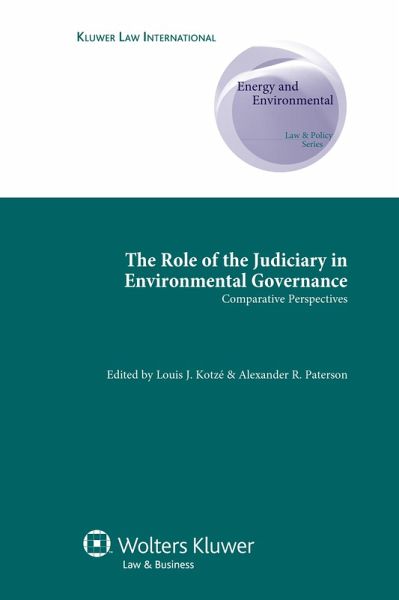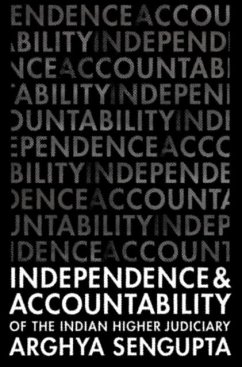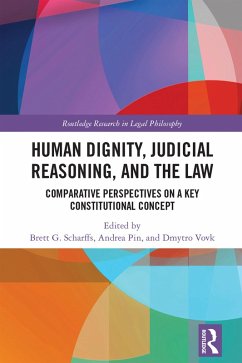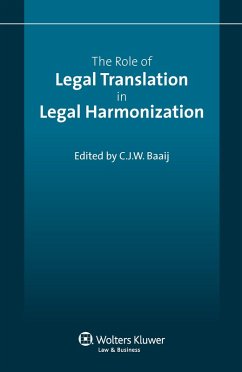
Role of the Judiciary in Environmental Governance (eBook, PDF)
Comparative Perspectives
Redaktion: Kotz&x00E9;, Louis J.; Paterson, Alexander R.

PAYBACK Punkte
74 °P sammeln!
Although the concept of 'environmental governance' has yet to be precisely defined, it is already clear that domestic courts worldwide are playing an increasingly important role in developing, interpreting, applying and enforcing environmental law. This important book investigates the environmental legal frameworks, court structures and relevant jurisprudence of nineteen countries, representing legal systems and legal cultures from a diverse array of countries situated across the globe. In doing so, it distils comparative trends, new developments, and best practices in adjudication endeavours,...
Although the concept of 'environmental governance' has yet to be precisely defined, it is already clear that domestic courts worldwide are playing an increasingly important role in developing, interpreting, applying and enforcing environmental law. This important book investigates the environmental legal frameworks, court structures and relevant jurisprudence of nineteen countries, representing legal systems and legal cultures from a diverse array of countries situated across the globe. In doing so, it distils comparative trends, new developments, and best practices in adjudication endeavours, highlighting the benefits and shortcomings of the judicial approach to environmental governance.
Among the many judicial initiatives and issues covered in this book the reader will find discussions of the following:
Written by leading academics and practitioners from the selected countries, each chapter includes detailed analysis of relevant court judgments as well as suggestions for reform.
As a critical and informative exposition of current issues relating to the judiciary and environmental governance, this book contributes to a better understanding of the manner in which sustainable environmental governance may be achieved by way of judicial intervention. It will be an invaluable tool for judges, decision makers, environmental law scholars and private sector actors from around the world to further advance their knowledge of environmental law, governance, reform and implementation at the national, regional and international levels.
Among the many judicial initiatives and issues covered in this book the reader will find discussions of the following:
- promoting constitutional rights to a healthy environment;
- reconciling environmental and aboriginal rights;
- recognizing public rights to the environment in laws protecting private property;
- promoting the separation of powers doctrine;
- pronouncing on the validity of executive and legislative action;
- distilling the mandate of environmental authorities;
- creating specialist environmental courts or tribunals;
- applying international environmental principles in the domestic context;
- interpreting and rectifying legislative anomalies;
- creatively using comparative jurisprudence to circumvent domestic statutory deficiencies;
- imposing liability on offenders to rehabilitate damaged environments;
- developing common law remedies to rectify environmental harm;
- reducing costs and risks associated with environmental litigation;
- relaxing or removing procedural constraints to facilitate public interest litigation;
- combating undue political interference;
- setting ecological limits to the use and development of natural and physical resources; and
- generating public awareness and political will.
Written by leading academics and practitioners from the selected countries, each chapter includes detailed analysis of relevant court judgments as well as suggestions for reform.
As a critical and informative exposition of current issues relating to the judiciary and environmental governance, this book contributes to a better understanding of the manner in which sustainable environmental governance may be achieved by way of judicial intervention. It will be an invaluable tool for judges, decision makers, environmental law scholars and private sector actors from around the world to further advance their knowledge of environmental law, governance, reform and implementation at the national, regional and international levels.
Dieser Download kann aus rechtlichen Gründen nur mit Rechnungsadresse in A, B, BG, CY, CZ, D, DK, EW, E, FIN, F, GR, HR, H, IRL, I, LT, L, LR, M, NL, PL, P, R, S, SLO, SK ausgeliefert werden.













